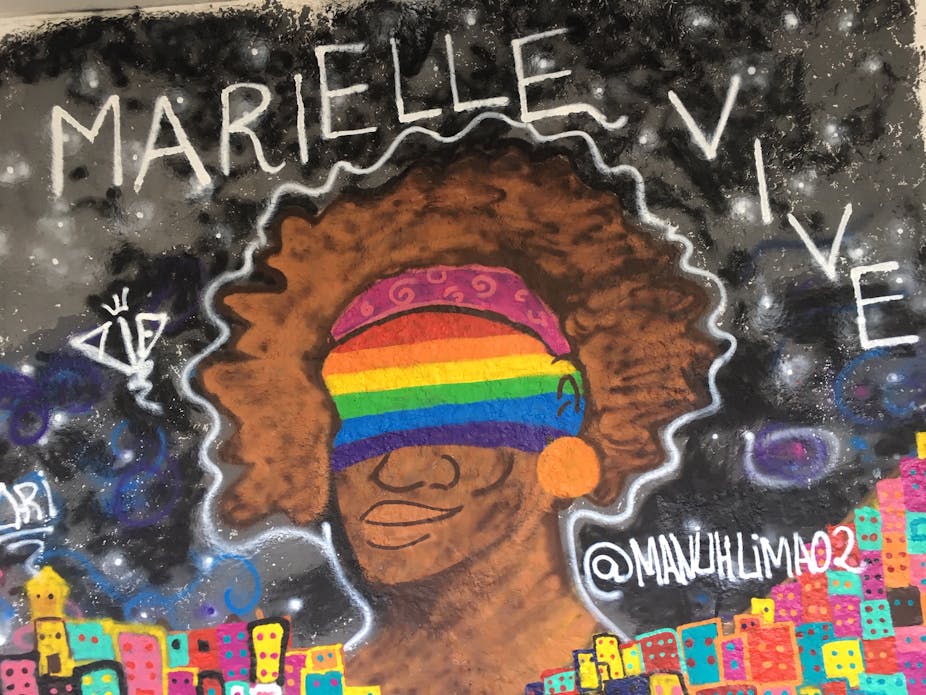Jair Bolsonaro was elected president of Brazil in October 2018 and took office in January 2019. Since then, the Ministry of Women, Family and Human Rights has chosen to remove the legal protection status of lesbian, gay, bisexual, trans and queer (LGBTQ) people. Some politicians are now pushing for a ban on talking about gender diversity and sexual orientation in schools.
Bathroom laws pertaining to which toilet facilities trans people are allowed to use and bills defining what constitutes a family, same sex marriage and laws enabling trans people to change their legal name are also seen to be under threat.
Brazil has a reputation as one of the most violent countries in the world and is known as the LGBT “murder capital” – 167 trans people were reported murdered between October 1, 2017 and September 30, 2018 alone. In the lead up to and since Bolsonaro’s election, LGBT hate crime has increased.
No wonder that many Brazilian LGBTQ people are worried that they are becoming isolated from the rest of the world. Marielle Franco – a young politician who took a strong stance against police violence – was murdered in Rio de Janeiro in March 2018.
She was a bisexual black woman who grew up in the Maré favela and pushed for social justice for marginalised people in the city. She was reportedly targeted by professional killers.
In Brazil, military police patrol the streets and are independent from the municipal police who carry out investigations. In March 2019, a year after her murder, it was reported that two ex-military police had been arrested for the killing.
Theusa Passareli – a 21-year-old art student who identified as genderqueer or non-binary – was murdered in April 2018, killed on their way home from a party.
Their work was incomplete in Universidade do Estado do Rio de Janiero’s design studio when I visited in November 2018 and will stay to commemorate their memory, as the university and the trans community mourn the murder of another young person.

A safe place to protest
I was in Rio for a short residency with the TransArte festival – a three day art show that explores gender identity and sexuality. The festival brings together trans people and allies to exchange ideas, make and share work, and celebrate the strengths of the LGBT community in Brazil within a place of safety.
It’s not easy to protest when faced with violence, nor is it easy to enjoy culture – particularly for people living in poverty where basic needs are difficult to meet. Trans artists have said that being trans is a barrier to participating in the arts, but “safe spaces” such as the TransArte festival allow protest art to flourish and create opportunities for LGBTQ people to express themselves.

A theatre company led by trans people created Come As You Are – a series of autobiographical stories with physical theatre and improvisation. The stories were about family – supportive and loving family as a source of strength, and familial rejection as a result of being trans.
They explored life as trans men and women in a culture of toxic masculinity, normativity and police brutality. A photography exhibition of several artists included Bernardo de Castro Gomes, whose work also explored his identity as a black trans man facing intimidation, harassment and violence.
Queer drag artists such as Le Circo de la Drag spoke about their political performance – using their bodies to resist toxic masculinity and defy the threats of violence they often receive.

The show Monster, Whore, Bitch – Waldirene’s Dreams, directed by Dandara Vital, compiled the everyday experiences of Brazilian trans people interwoven with a re-telling of the story of Waldirene – the first trans woman to undergo gender reassignment surgery in Brazil in December 1971, at the height of the military dictatorship.
Resistance is clearly flourishing in Brazil against the odds and not only within festivals like TransArte. A Portuguese translation of Jo Clifford’s play The Gospel According to Jesus, Queen of Heaven was due to open in Londrina, a city in southern Brazil, but the venue cancelled at the very last moment.
The lead, a trans woman called Renata Carvalho, received death threats. The company moved to a semi-derelict space where they performed by torchlight instead, despite injunctions from both Pentecostal and Catholic groups to stop the production.
My own experiences working with the TransArte festival team in Rio have shown me the value of safe places free from judgement and hostility. The people we worked with told us that being there in solidarity with the trans communities of Rio felt like a powerful action in itself, resisting the culture of violence that thrives in Bolsonaro’s Brazil.

